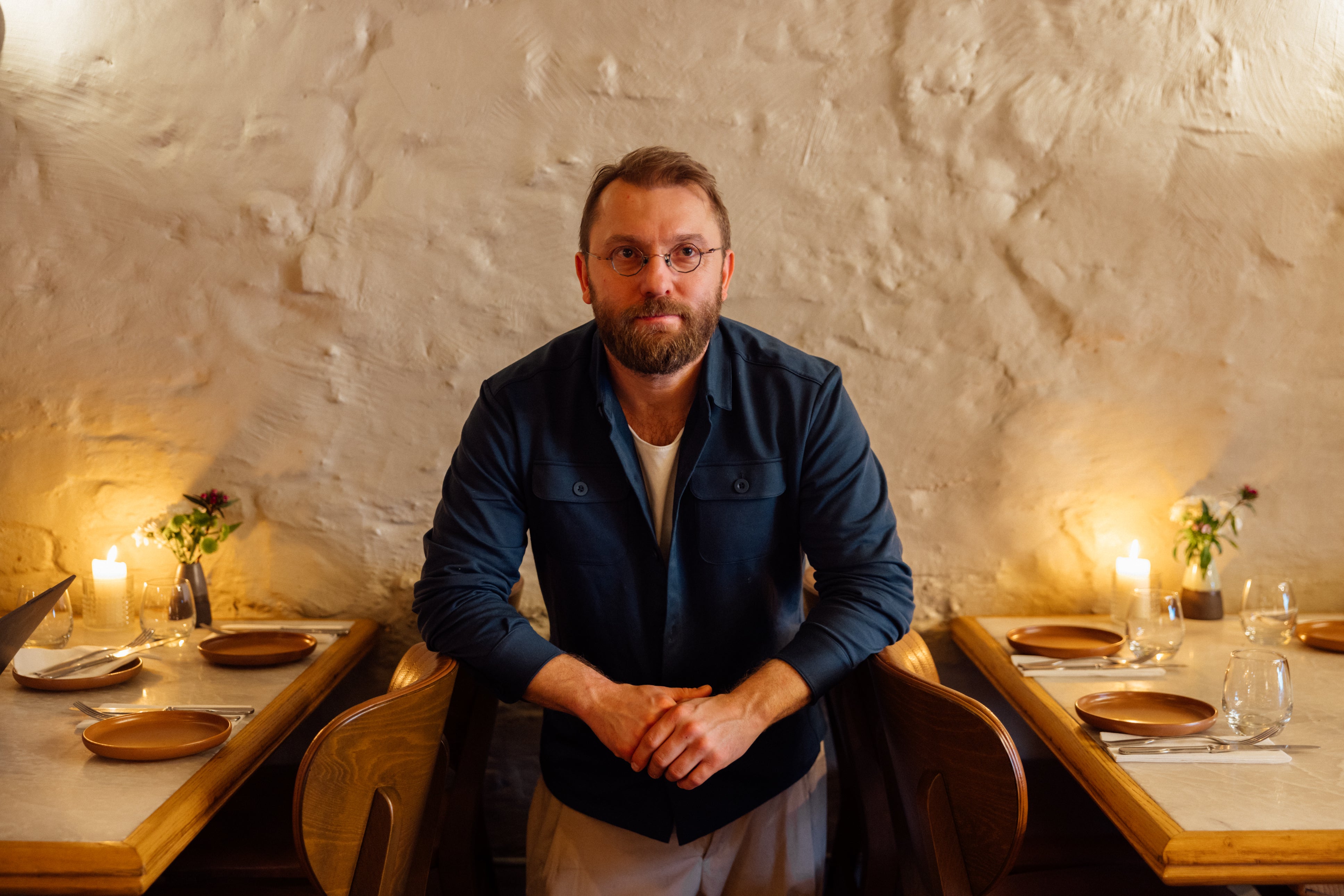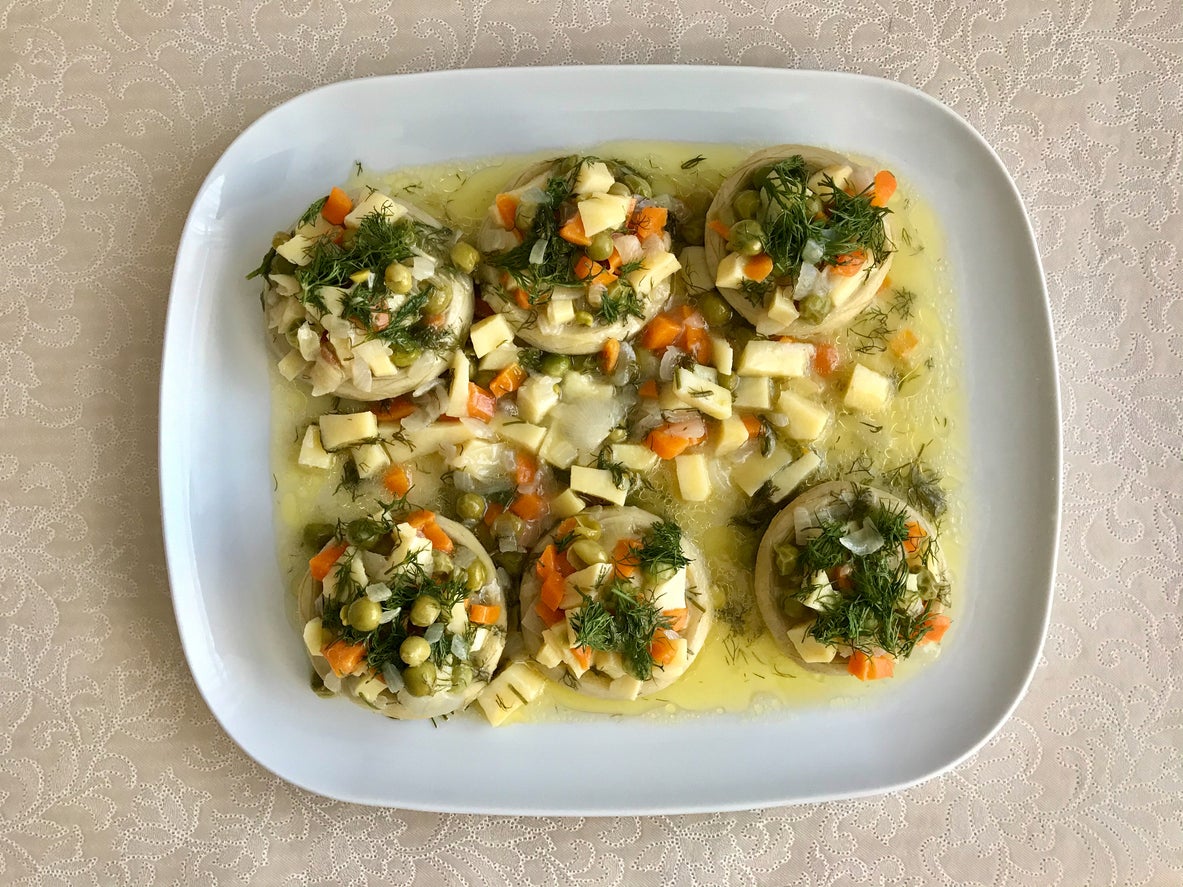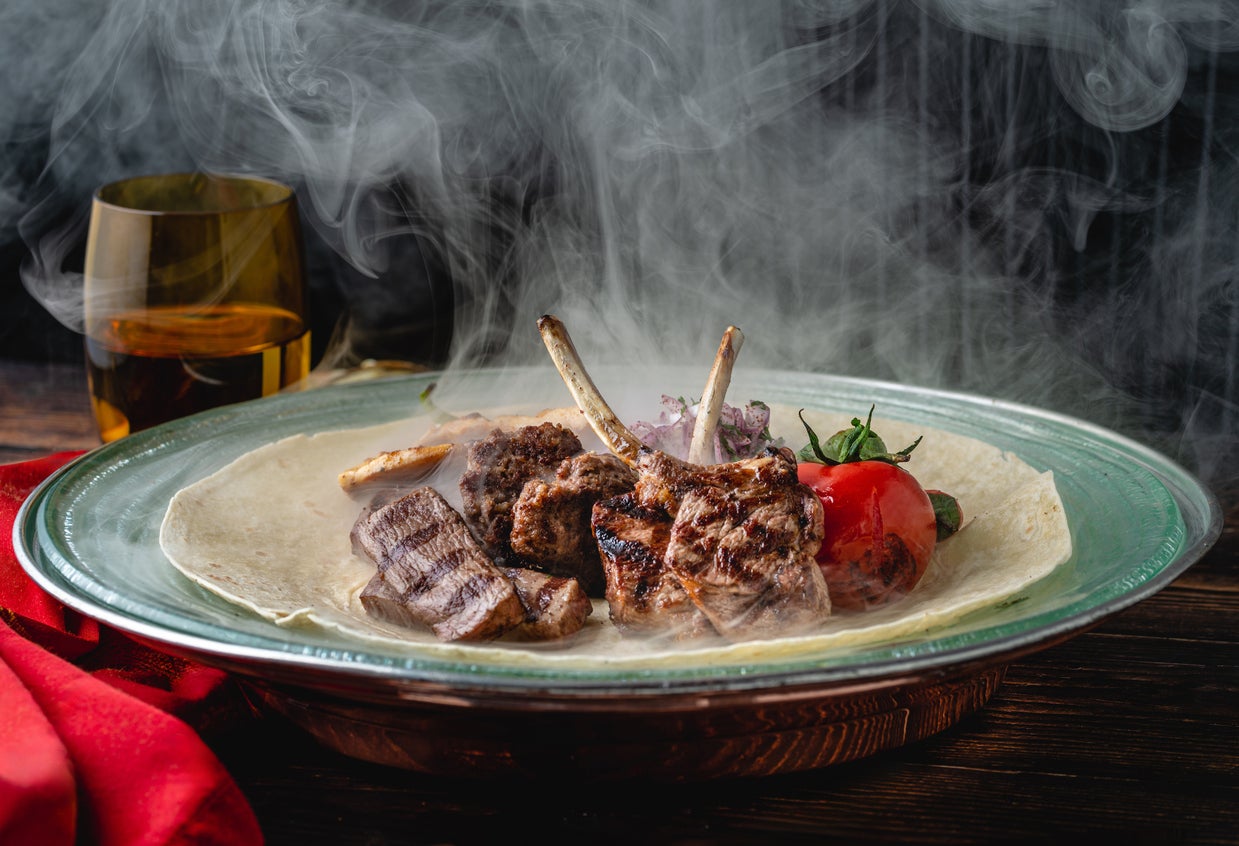There’s a familiar image conjured by the words “Turkish BBQ”. A heaving plate of meat, skewers bent under the weight, rice piled so high it could double as a topographical feature and a smear of sauce trying to hold it all together. It’s the stuff of post-pub mythology – dependable, fast and best consumed half-reclining on a curb.
Kemal Demirasal is here to tell you that’s not a real kebab.
“In London, kebabs are often about size – how big the skewer is, how much rice comes with it,” he says. “There’s even a joke about kebabs being served on a mountain of rice!” He chuckles, but only just. Because for Demirasal – the windsurfer-turned-chef behind The Counter in Notting Hill – this is personal. He’s on a mission to reclaim the mangal.
The quiet fire
Turkish barbecue, or mangal, is not a pyrotechnic sport. There are no roaring flames, no frantic flipping, no basting theatrics with bottles of lager. It’s “all about patience and precision,” Demirasal explains. “Mangal doesn’t like flames, it prefers to cook in a calm state.”
That calm is earned. The grill is always charcoal – never gas – and the heat must be coaxed, not conquered. “If needed, we even cover the coals with ash to keep things gentle,” he says. “The sweet spot for a proper mangal skewer is around 8–12 minutes… You want to cook just long enough to get that beautiful Maillard caramelisation, but never to the point of burnt ends.”
The cuts of meat are modest – small, skewered or minced. No thudding hunks of beef, no novelty sausages. The flavour? Deliberately restrained. “We use simple tenderisers like onion, black pepper and yoghurt,” he says. “The focus is on bringing out the natural flavour rather than relying on heavy marinades.”
It’s this restraint, this careful calibration of size, heat and time, that delivers the perfect bite. “In Turkey, it’s all about balance. Kebab meat is portioned and served in thin layers, keeping it tender, juicy and caramelised on the outside.”
Kebabs, corrected
At The Counter, Demirasal is not just cooking kebabs. He’s correcting them.
“Skewers tend to be too thick. By the time the inside is cooked through, the texture changes completely – it becomes more like a kofta, losing the essence of a proper kebab,” he explains. And don’t get him started on the meat mix. “Traditional kebabs are made only with lamb, using different cuts for depth of flavour. But in London, beef is often added as a cost-saving measure, which totally changes the taste.”
Even the seasoning is suspect. “A real kebab only has a fine brunoise cut of capsicum peppers and a bit of salt – no more than 10% of the mix,” he says. “But in London, you’ll find all sorts of extras like parsley, garlic and onion, which makes it something else entirely.”

He’s not a purist for purity’s sake. He’s protecting a culinary philosophy – one rooted in restraint, discipline and deep respect for ingredients.
The Counter culture
Tucked into a quiet corner of Notting Hill, The Counter is Demirasal’s statement piece – a restaurant that champions the food of south-eastern Turkey without compromising on technique or tradition. There are no gimmicks here – just precise, soulful cooking.
“Turkish cuisine is definitely open to reinterpretation, but there’s a fine line. If you lose the foundation of the original dish, people won’t accept it.,” he says.
Yes, there are skewers. But they’re joined by dishes like white chocolate baba ganoush – a clever, quiet evolution of the classic. “We swapped butter for white chocolate, adding just a subtle sweetness without overpowering the dish,” he explains. “The key question is: does the new version still make sense? I believe with our baba ganoush, we nailed it.”
Dinner party, Demirasal-style
So what does a real Turkish BBQ look like when you bring it home? It’s not a frenzy of meat and marinade – it’s a curated, balanced spread built around one guiding principle: simplicity.
“Keep it simple,” Demirasal says. “Let the food shine on its own.”
The centrepiece is lamb, of course – specifically his Turkish BBQ rack of lamb, marinated in sweet red pepper paste (biber salçası) and thyme, and finished with a sizzling herb butter applied using a fresh sprig brush. It’s deeply flavourful, smoky and just the right side of indulgent.
Supporting acts include a creamy, herb-flecked spicy yoghurt pasta salad tossed with Aleppo chilli and sun-dried tomatoes (“served chilled or at room temperature – it works either way”), and zeytinyağlı enginar, or artichokes braised in olive oil with broad beans and dill – a dish he says is “perfect for a warm day.”
No Turkish BBQ would be complete without çoban salatası – shepherd’s salad – his version dressed in a punchy pomegranate molasses vinaigrette. Optional toppings include walnuts for crunch or feta for richness. “Acidity is our secret weapon,” he says. “We use apple cider vinegar, pomegranate molasses and sumac to cut through the richness of the grilled meats. Fresh herbs like mint and parsley also keep things balanced. And when a dish is particularly heavy, we serve it with şalgam – fermented black turnip juice – for a refreshing contrast.”
Smoke, not spectacle
A true mangal is as much about atmosphere as it is about appetite. “A mangal is best enjoyed with a small group – maybe four to eight people,” says Demirasal. “The grill should be right next to the table, so you can feel the warmth and smell the smoke.”
There’s no panic. No pile of forgotten sausages burning at the back. Just steady smoke, simple food and good company. And maybe, if you’re lucky, a breeze from the Aegean.
“If it’s fish, it should be by the sea. If it’s meat, somewhere in nature – a valley, by a waterfall, in the woods,” he says. “We don’t usually finish with dessert, but a seasonal fruit platter and Turkish coffee brewed right on the mangal? That’s the perfect ending.”
Looking ahead
There’s already talk of a second restaurant – one that celebrates the lighter, brighter flavours of Turkey’s west coast.
“A West Turkey concept would be all about seafood – blanched bitter herbs, Greek-style salads, lots of lemon and fresh thyme, fava beans, artichokes and, of course, great olive oil,” says Demirasal. “Less reliance on heavy spices, more focus on fresh flavours. That’s the way to do it.”
Wherever he goes next, the fundamentals will stay the same: charcoal not gas, balance over bravado, flavour before fire.
The final word
If you’re planning a Turkish BBQ this summer, you don’t need to master mangal wizardry overnight. But you do need to shift your mindset. This isn’t food for show – it’s food with soul.
So ditch the flame-thrower. Skip the rice mountain. And take it from a former windsurfing champ turned culinary purist – kebabs, done right, don’t need to prove anything.
Zeytinyağlı Enginar (artichokes) recipe

Tender artichokes braised in olive oil with slow-cooked broad beans, brightened with citrus and fresh herbs. Perfect for a warm day.
Serves: 4
Ingredients:
200g fresh green fava beans, shelled
1 large white onion, finely chopped
5 tbsp early harvest extra virgin olive oil
1 tbsp sugar (traditional touch)
½ tsp sea salt
Juice of 1 lemon (plus extra for rubbing the artichokes)
250ml water
1 small bunch fresh dill, chopped
Method:
- Prepare the artichokes by rubbing the artichoke hearts with lemon juice to prevent browning. Set aside.
- In a wide pan, heat 3 tbsp olive oil over medium heat. Add the chopped onions and gently sauté until soft and translucent.
- Add the fava beans to the onions and stir for a minute.
- Place the artichoke hearts flat-side up in the pan. Sprinkle with sugar and salt, then pour in the lemon juice and water.
- Cover the pan and let it simmer on low heat for 30-40 minutes, or until the artichokes and fava beans are tender. Occasionally baste the artichokes with the cooking liquid to enhance their flavour.
- Serve the dish, drizzling the remaining 2 tablespoons of olive oil over the top. Let it cool to room temperature, then garnish with freshly chopped dill before serving.
Serving tip: Traditionally served cold or at room temperature, with extra lemon wedges and crusty bread.
Çoban Salatası (shepherd’s salad) recipe
A crisp mix of cucumbers, tomatoes, and onions, perfectly balanced with olive oil, lemon, and sumac. The perfect accompaniment to grilled meats, fish, or warm flatbread.
Serves: 2
Ingredients:
4 ripe summer tomatoes, diced
1 cucumber, diced
1 red capsicum, diced
1 green capsicum, diced
½ small red onion, finely chopped
1 small bunch parsley, chopped
1 small bunch mint, chopped
1 tsp sumac
½ tsp sea salt
6 tbsp early harvest extra virgin olive oil
2 tbsp pomegranate molasses
Juice of 1 lemon
Optional toppings:
50g crushed walnuts (for extra texture)
50g crumbled creamy, salty feta (for richness)
Method:
- In a large bowl, combine the diced tomatoes, cucumber, capsicums, red onion, parsley, and mint.
- In a small bowl, whisk together the olive oil, pomegranate molasses, lemon juice, sumac, and salt.
- Drizzle the vinaigrette over the salad and toss gently to ensure even coating.
Optional: For extra texture and flavour, sprinkle with crushed walnuts or crumbled feta.
Spicy yoghurt pasta salad
Fusilli tossed in a creamy yogurt and olive oil dressing, with Aleppo chilies, sun-dried tomatoes, citrus zest, and fresh herbs.
Serves: 4
Ingredients:
300g fusilli pasta
200g thick yoghurt (Greek or strained)
3 tbsp extra virgin olive oil
1 tsp Aleppo chili flakes
50g sun-dried tomatoes, finely chopped
Zest of 1 lemon
10-12 cherry tomatoes, halved
2 tbsp fresh dill, chopped
2 tbsp fresh mint, chopped
Salt and black pepper to taste
Method:
- Cook the pasta, boiling it in salted water until al dente. Drain and rinse under cold water to cool it down. Set aside in a bowl.
- In a separate bowl, whisk together yoghurt, olive oil, lemon zest, and Aleppo chili flakes. Season with salt and black pepper.
- Add sun-dried tomatoes, cherry tomatoes, dill, and mint to the pasta. Pour the yoghurt dressing over the pasta and toss gently until everything is well coated.
- Let it rest for 5-10 minutes to allow the flavours to meld. Serve chilled or at room temperature, drizzled with a touch of extra olive oil and a sprinkle of Aleppo chili for a finishing touch.
Turkish BBQ rack of lamb

Whole racks of lamb marinated in salça (Turkish pepper paste) and spices, then grilled to juicy, fall-apart perfection.
Serves: 4
Ingredients:
For the marinade:
1 full rack of lamb chops
2 tbsp sweet red pepper paste (Tatlı Biber Salçası)
1 tsp dried thyme
3 tbsp early harvest olive oil
½ tsp sea salt
For the butter baste:
100g unsalted butter
Zest of 1 lemon
1 tsp freshly cracked black pepper
1 clove garlic, finely grated
2 tbsp finely chopped red onion
2 tbsp verjuice (or substitute with a mix of white grape juice and vinegar)
½ tsp sea salt
For the herb brush:
A bunch of fresh tarragon, thyme, sage, and rosemary, tied together
Method:
- Mix the red pepper paste, dried thyme, olive oil and salt for the marinade.
- Coat the rack of lamb thoroughly, massaging the marinade into the meat. Let it rest in the fridge for at least 6 hours.
- Prepare the charcoal mangal by burning the charcoal until it forms a consistent, hot ember base. Ensure the heat is intense and steady, avoiding direct flames.
- Grill the lamb, fat side down on the rack, and sear it for 3-4 minutes. Turn occasionally, for about 12-15 minutes in total, until it is caramelised and is medium-rare inside (52-54C/125-130F).
- Make the butter baste by melting butter in a small pan and add lemon zest, black pepper, garlic, red onion, verjuice, and salt. Stir gently.
- Dip the herb bundle into the butter baste and baste the lamb continuously in the last 5 minutes of grilling. Let the butter sizzle and coat the meat.
- Remove the rack from the grill and let it rest for 3 minutes. Slice into individual chops and serve with sumac onions, grilled flatbread and a side of tzatziki or smoky eggplant dip.


